Share
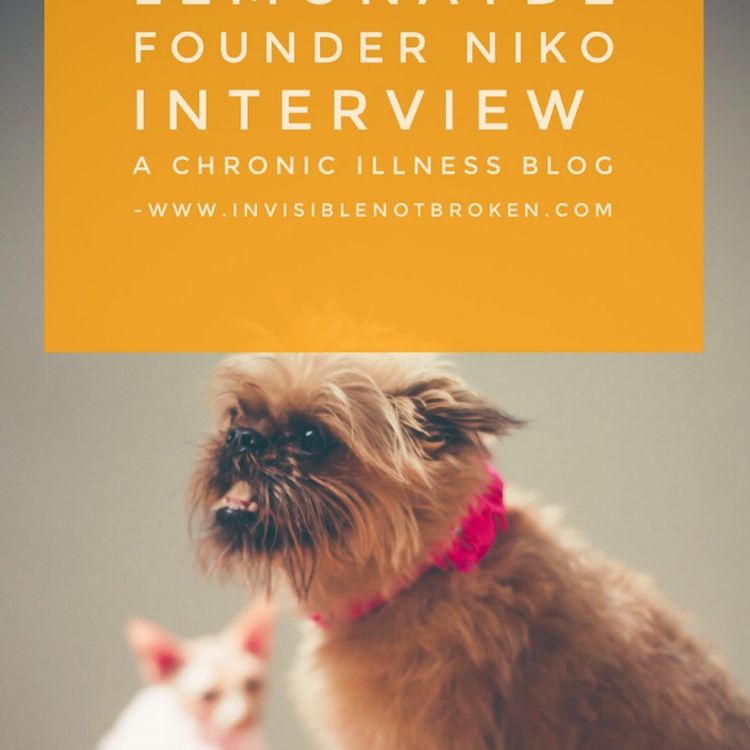
Invisible Not Broken - Chronic Illness Podcast Network
Lemonayde App Founder Niko Interview About Dating With Chronic Illness and Tinea Versicolor
An interview with Niko, founder of the chronic illness community and dating app Lemonayde, about dating with chronic illness and his own chronic skin issue Tinea Versicolor.
Name *
Niko Geoffroy
What is your disorder? *
At what age did your disorder become a daily issue? *
15
Who were you before your illness became debilitating? *
Before my condition, I was already pretty introverted and my skin condition really added to that and made it harder to get out of it.
What would you do if you were not dealing with your invisible illness? *
Since my illness is a skin condition, it is visible. I think all of my adversities are what pushes me to be as ambitious as I am. If not for my condition, I certainly would not have started Lemonayde.
What would you like people to know about your daily life? *
My daily life, especially when it includes any activity that forces me to take my shirt off, is full of a lot of explaining. Our culture is pretty hostile towards skin conditions, in general. The first question they need to know is, "Is it contagious?". Also, the assumption is usually that skin conditions are a result of poor hygiene, which, of course, is just not so. I take these moments to educate.
What would make living and moving in the world easier for you? *
More communities where people feel comfortable to be vulnerable in regards to their health without the expectation of judgement. There's a sense of relief and liberation that comes with being around people who you don't have to explain your health to.
Do you have any life hacks? *
More like mantras: 1) Your disadvantages are actually advantages. Find a way to use them as such. 2) The only two opinions I care about are that of parents. Everything else is noise. 3) Set your priorities and stick to them. Your health should be #1.
What kind of support do you get from family or friends? *
I love my family, they;re incredibly supportive, in that they don't treat any differently. And I pick my friends wisely. They don't see me any differently either. My family and friends know that I'm very independent and if I don't ask for help, it's because I DON'T want it. But if I do ask, I probably really need it.
Have you ever had someone not believe you have an invisible illness because of your appearance and if so are there any examples that stand out? *
I've had moments when people were convinced that my skin condition was due to poor hygiene even though I explained it has nothing to with hygiene. But whatevs.
How has your invisible illness affected your relationships? *
Woo. My skin condition started to develop in High School, which we all know is the most unforgiving place known to man. And with the emergence of a skin condition, that I had convinced myself was unsightly, came the insecurities and self-doubt. I put up a whole lot of walls when it came to social and dating activities. For me, being intimate was pretty much off the table. I didn't want to have to find myself in the excruciating situation of having to explain my skin condition and having the whole world know about it. My first relationship started in college and it was with someone who also had a skin condition (psoriasis). This may sound weird now but I initially fought off this relationship only because I knew she also had a skin condition. I don’t know why, but I guess I just didn’t want to convince myself that I’m only supposed to date people who were “like me” (whatever that means). But I was also keeping myself away from something great. It was just a strange confusing paradox. Fortunately, I lost that fight and we started dating and it was a wonderful relationship. We bonded about things only we would be able to understand. We skipped the whole “worrying about my condition” phase and just went straight to the fun part. We dated for quite a while and eventually moved on, as with most relationships. I did explore other relationships after the first, but it was the first that gave me that initial boost of confidence; validation of my awesomeness; and the relief that all ISN’T lost after all.
Is there anything you are afraid to tell people in your life? *
Very little. I used to be afraid to talk about my skin condition, now I don't care at all. I also used to be afraid to tell people about my undocumented status, now I couldn't care less.
Does the fact that your disease is invisible change how healthcare professionals treat you? *
The first time I saw a doctor about my condition, the first thing he recommended was Selsun Blue Medicated Formula. However, I told him that I've been using Selsun Blue for quite some time with no results and I asked him to prescribe something else. And this guy was just so unbelievably insistent. He told me I had to try it. But I didn't want to spend money on this doctor visit knowing that it would be a waste. And he did not let up. And it was extremely frustrating.
What is your best coping mechanism? *
Mashed potatoes and cookies. Also, I'm a self-healer. I like to do all of my healing and thinking on my own. So I meditate at least once a day.
What are you the most concerned about and the hopeful for in the future? *
This is on a grander scale but I do believe that our society is coming to the realization that empathy is the greatest healing power that's ever existed. My concern is that we will know that and consciously choose not to use it. However, my hope (and belief) is that we will. This can summed by the following lyric: You think the only people who are people Are the people who look and think like you But if you walk the footsteps of a stranger You'll learn things you never knew, you never knew.
What is your favorite swear word?
Clusterfuck
Is there anything you want to make sure we talk about during the interview? Like an organization you want to promote or something specific that you deal with.
I'd like to mention Lemonayde and how and I why decided to created it. As well as the mission behind it. We don't have to get too deep into it.
What is the hardest and/or best lesson your condition has taught you?
My ability to accept outcomes I have no control over. It's also given me the single trait I believe is my superpower... Empathy.
What is the best purchase under $100 that helped your life
Coffee. The book "David and Goliath - Malcolm Gladwell". The book "Our Revolution - Bernie Sanders"
Any questions you think we should add to this list?
"What do you believe is your purpose?" OR "What is the source of your motivation? What's the fuel that keeps you going?"
More episodes
View all episodes
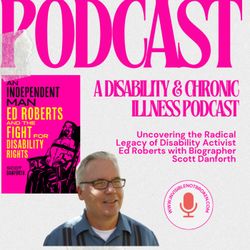
Uncovering the Radical Legacy of Disability Activist Ed Roberts with Biographer Scot Danforth
50:59|Uncovering the Radical Legacy of Disability Activist Ed Roberts with Biographer Scott DanforthKeywordsEd Roberts, disability rights, activism, biography, independence, community, technology, publishing, women in activism, accessibilityTakeawaysEd Roberts was a pivotal figure in the disability rights movement.His activism began at UC Berkeley with the Rolling Quads.The fight for disability rights is ongoing and requires constant vigilance.Family dynamics play a crucial role in fostering independence for disabled individuals.Community building is essential for effective activism.Technology can greatly enhance accessibility for disabled individuals.The Center for Independent Living was a groundbreaking initiative for disability rights.Women played a significant but often overlooked role in the disability rights movement.Writing a biography involves difficult choices about what to include or exclude.The publishing process can be challenging, especially for underrepresented stories.SummaryThis conversation explores the life and legacy of Ed Roberts, a pivotal figure in the disability rights movement. Scott Danforth, the author of a biography on Roberts, discusses the challenges and triumphs of advocating for disability rights, the importance of community and independence, and the role of technology in enhancing accessibility. The conversation also touches on the often-overlooked contributions of women in the movement and the complexities of writing a biography. Danforth shares insights from his research and the publishing process, emphasizing the need for continued advocacy and the importance of storytelling in the fight for disability rights.TitlesUnveiling Ed Roberts: A Disability Rights PioneerThe Legacy of Ed Roberts and Disability ActivismSound bites"This is not a very well-known man.""He had polio as a teenager.""He loved the technology."Chapters00:00 Introduction to Ed Roberts and His Legacy02:13 The Fight for Disability Rights09:07 Independence and Family Dynamics14:53 Building Community and Activism21:28 Technological Advancements and Accessibility26:57 Revitalizing the Center for Independent Living27:24 The Legacy of Ed Roberts and Disability Activism28:23 Unveiling the Myths of Disability Leadership30:49 The Unsung Heroes of the Disability Rights Movement31:54 Chronic Illness and the Overlooked Voices33:30 The Joys and Challenges of Writing a Biography35:21 The Process of Research and Writing36:17 Editing and Storytelling in Biography38:44 Navigating the Publishing Landscape41:25 The Journey into Disability Studies43:58 Dreams vs. Reality in Disability Advocacy46:46 The Importance of Community and Creativity48:23 Joy as Resistance in Activism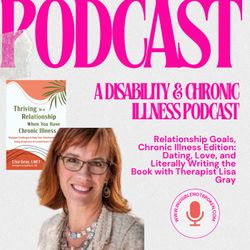
Relationship Goals, Chronic Illness Edition: Dating, Love, and Literally Writing the Book with Therapist Lisa Gray
43:45|Keywordschronic illness, relationships, conflict resolution, empathy, writing process, power imbalance, emotional management, self-help, therapy, communicationSummaryIn this conversation, Lisa Gray, a marriage and family therapist, discusses the complexities of relationships when chronic illness is involved. She shares insights on conflict resolution, the importance of empathy, and how to navigate power imbalances in relationships. Lisa also delves into her writing process, the significance of finding meaning in chronic illness, and practical tools for writing and publishing. The discussion emphasizes the need for understanding, communication, and the ability to adapt in relationships affected by chronic illness.TakeawaysConflict increases intimacy if done right.Healthy conflict means knowing your partner better.Stop fighting when you're already mad.Impulse control is key in managing conflict.Power imbalances can affect relationships with chronic illness.Empathy must go both ways in relationships.Finding meaning is crucial in the grieving process.Values can guide actions despite chronic illness.Writing can be a therapeutic process.Use tools that work for your energy levels.TitlesNavigating Relationships with Chronic IllnessThe Art of Healthy ConflictSound bites"Empathy needs to go both ways.""Intimacy is very broad.""Weighted blankets are so comforting."Chapters00:00 Introduction to Chronic Illness and Relationships02:55 Navigating Conflict in Relationships06:02 Impulse Control and Managing Emotions09:07 Power Imbalances in Relationships11:54 Empathy in Chronic Illness Relationships14:57 Core Skills for Managing Chronic Illness17:42 Finding Meaning and Values in Relationships20:55 Personal Discoveries Through Writing23:55 Building Empathy Through Curiosity24:15 Exploring Virtual Reality and Empathy25:39 Relationships and Support in Chronic Illness28:05 Intimacy and Chronic Illness30:30 The Writing Process and Tools for Writers38:58 Publishing Insights and ResourcesTranscript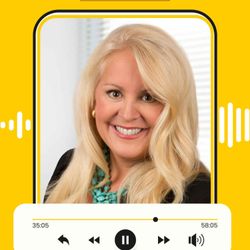
Navigating the Patient Journey with Author Brenda Snow
41:00|SummaryIn this conversation, Brenda Snow shares her personal journey as a patient diagnosed with multiple sclerosis and discusses her book, 'Diagnosed: The Essential Guide to Navigating the Patient Journey.' She emphasizes the universal experience of navigating chronic illness, the importance of grief and acceptance, and the need for strong doctor-patient relationships. Brenda also highlights the significance of maintaining one's identity while caregiving and the power of storytelling in healing. The discussion concludes with advice for aspiring writers and the importance of sharing personal narratives.Chapters00:00 Introduction to Brenda Snow and Her Journey02:49 The Universal Patient Experience06:48 Navigating Grief and Acceptance12:41 The Doctor-Patient Relationship20:42 Identity and Caregiving26:12 Finding Growth in Adversity31:56 The Power of Storytelling35:40 Advice for Aspiring Writers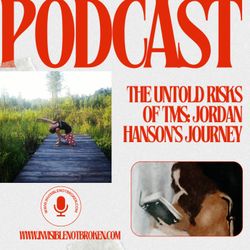
The Untold Risks of TMS: Jordan Hanson's Journey
01:00:05|KeywordsTMS, transcranial magnetic stimulation, brain injury, mental health, medical gaslighting, patient advocacy, chronic illness, technology in healthcare, self-care, mindfulnessSummaryIn this conversation, Jordan Hanson shares her personal journey with transcranial magnetic stimulation (TMS), a procedure intended to treat mental health issues. She discusses the initial excitement about the treatment, the subsequent negative effects she experienced, and the challenges of navigating the medical system. The conversation highlights the importance of patient advocacy, community support, and the role of technology in managing health. Jordan emphasizes the need for awareness and understanding of the risks associated with TMS and the importance of self-care and mindfulness in coping with chronic illness.TakeawaysTMS is a procedure that uses magnetic fields to stimulate brain activity.Jordan experienced significant negative effects from TMS, including brain injury symptoms.Medical gaslighting is a common issue faced by patients seeking help.Community support is crucial for those dealing with chronic illness.Technology, including AI, can assist in managing health and communication.Self-care and mindfulness are essential for coping with chronic illness.Advocacy is important to raise awareness about the risks of TMS.Family planning can be complicated by health issues and uncertainties.Understanding the impact of chronic illness on daily life is vital.The journey of healing is ongoing and requires patience and support.TitlesThe Hidden Risks of TMS: A Personal JourneyNavigating the Medical Maze: Jordan's TMS ExperienceSound bites"I was called headache girl for a year.""I want to share my story to help others.""I have to protect myself and my energy."Chapters00:00 Introduction to TMS and Jordan's Journey01:13 Understanding the Impact of TMS on Life01:28 Introduction and Background on TMS04:20 Understanding Trans-Cranial Magnetic Stimulation (TMS)07:23 The Experience of TMS Treatment10:20 The Impact of TMS on Daily Life13:09 Medical Gaslighting and Patient Advocacy16:13 The Journey to Recovery and Diagnosis19:14 Community Support and Sharing Stories22:18 The Decision to Create a Documentary25:13 Advocacy and Future Goals36:11 The Need for Scientific Understanding in TMS40:42 Coping with Chronic Illness and Disability44:52 Navigating Family Planning Amidst Uncertainty52:54 Leveraging Technology for Brain Injury Support59:42 Personal Growth Through Adversity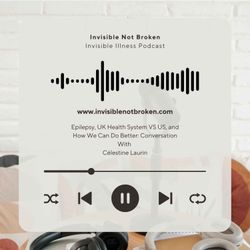
Epilepsy, UK Health System VS US, and How We Can Do Better: Conversation With Célestine Laurin
01:20:40|Epilepsy, UK Health System VS US, and How We Can Do Better: Conversation With Célestine LaurinSummaryIn this conversation, the speakers delve into the complexities of living with epilepsy and chronic illness, particularly focusing on the experiences of children and young adults. They discuss the challenges of diagnosis, the importance of support from family and friends, and the role of therapy in managing mental health. The conversation also touches on the stigma surrounding chronic illness, the impact of bullying, and practical advice for managing seizures and advocating for oneself in educational and social settings. Additionally, they explore how epilepsy is represented in the media and the need for better understanding and communication around the condition. This conversation delves into the complexities of living with epilepsy, particularly focusing on the challenges faced by women regarding medication and pregnancy. The speakers share personal experiences with the impact of epilepsy on their lives, careers, and the healthcare system. They discuss the stigma surrounding chronic illness, the importance of open communication with clients in business, and the differences in healthcare systems across countries. The conversation highlights the need for greater awareness and understanding of disability and chronic illness. In this conversation, the speakers discuss the challenges faced by individuals with disabilities, the impact of overprotection on children, and the need for inclusive spaces and universal design. They explore the healthcare systems in different countries, highlighting the disparities in access and affordability. The conversation emphasizes the importance of disability advocacy in health policy and the need for a more inclusive approach to legislation that considers the needs of all individuals, particularly those with chronic illnesses.Keywordsepilepsy, chronic illness, mental health, therapy, support, bullying, childhood illness, accommodations, media representation, epilepsy, medication, women’s health, chronic illness, disability, healthcare, personal stories, photography, career choices, mental health, disability, healthcare, universal design, overprotection, advocacy, inclusivity, chronic illness, education, mental health, accessibility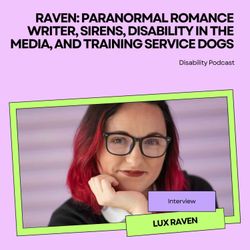
Raven: Paranormal Romance Writer, Sirens, Disability in the Media, and Training Service Dogs
52:33|Chapters00:00 Introduction to Romance Writing and Disability05:49 Life Changes During the Pandemic11:53 Writing Romance with Chronic Illness17:55 Representation of Disability in Romance24:35 The Viral Success of a Romance Novel31:07 Writing as a Form of Self-Discovery36:06 Navigating Writing with Disabilities49:59 The Journey of Training a Service DogSummaryIn this conversation, the speakers delve into the intersection of romance writing and disability representation, particularly focusing on the experiences of chronically ill individuals. They discuss the impact of the pandemic on their lives, the process of writing romance novels that feature disabled characters, and the importance of authentic representation in literature. The conversation also touches on the viral success of one speaker's romance novel, the emotional journey of writing, and the practical challenges of writing with disabilities. Additionally, they explore the journey of training a service dog and how it has positively influenced their lives.TakeawaysThe pandemic led to significant life changes and new diagnoses.Writing romance novels became a creative outlet during difficult times.There is a need for authentic representation of disabled characters in romance.Readers appreciate seeing themselves reflected in literature.The success of a romance novel can be validating for writers.Writing can be a form of self-discovery and healing.Navigating the writing process with disabilities requires adaptation and support.Service dogs can provide emotional and physical support for their owners.Community and connection are vital for those with chronic illnesses.The journey of self-publishing can be empowering despite challenges.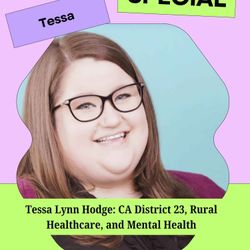
Tessa Lynn Hodge: CA District 23, Rural Healthcare, and Mental Health
53:55|SummaryIn this conversation, Tessa Lynn Hodge discusses her journey from being a licensed clinical social worker to running for office in District 23. She emphasizes the importance of community engagement, healthcare reform, and the need for authenticity in politics. Tessa shares her experiences and insights on the challenges faced by her community, particularly in rural areas, and highlights the significance of mental health accessibility and telehealth. Her campaign focuses on putting people over party and advocating for grassroots funding to ensure real change.Keywordsdisability, politics, healthcare, community, mental health, grassroots, Tessa Lynn Hodge, election, advocacy, social work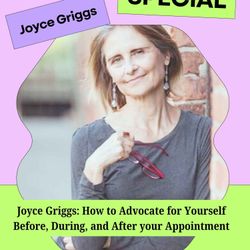
Joyce Griggs: How to Advocate for Yourself Before, During, and After your Appointment
50:25|Keywordshealth advocacy, patient empowerment, healthcare system, self-advocacy, doctor visits, healthcare resources, United States of Healthcare, patient stories, healthcare challenges, AI in healthcareSummaryIn this conversation, Joyce Griggs shares her journey into health advocacy, highlighting the challenges faced by patients in navigating the healthcare system. She discusses the importance of self-advocacy, preparing for doctor visits, and managing the dynamics between patients and healthcare providers. Joyce emphasizes the need for personalized care and the role of technology, including AI, in shaping the future of healthcare. The discussion also touches on the systemic issues within the healthcare system and the importance of community support and resources for patients.TakeawaysAdvocacy is crucial for navigating the healthcare system.Patients often face significant challenges in getting proper care.Self-advocacy is an essential skill for all patients.Preparing for doctor visits can improve outcomes.Emotional management is key before healthcare appointments.Bias exists in healthcare, affecting patient treatment.Community support can empower patients in their advocacy efforts.AI has potential benefits and risks in healthcare decision-making.Personalized care is necessary for effective treatment.Understanding insurance processes can help patients advocate for themselves.TitlesNavigating the Healthcare Maze: A Journey of AdvocacyEmpowering Patients: The Role of Self-AdvocacySound bites"We need to be our own advocates.""We are the experts of ourselves.""Personalized care is essential."Chapters00:00 Introduction to Health Advocacy02:54 Personal Journey into Healthcare Advocacy05:53 Navigating the Healthcare System08:25 Building the United States of Healthcare11:34 Resources for Health Advocacy14:23 Preparing for Doctor Visits17:07 Managing Emotions in Healthcare19:48 Interviewing Healthcare Providers22:49 Addressing Systemic Issues in Healthcare28:02 Navigating Healthcare Access Challenges30:38 Addressing Power Imbalances in Healthcare34:26 The Impact of Bias in Medical Treatment35:22 Evolving Perspectives in Medicine37:23 Utilizing Technology for Patient Advocacy42:04 Building Community and Support46:51 Envisioning a Better Healthcare System50:20 end cap.mp4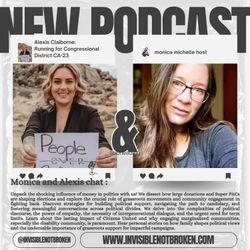
Citizens United & the Disability Vote: Reclaiming Our Democracy Witch Alexis Claiborne
01:14:51|Unpack the shocking influence of money in politics with us! We dissect how large donations and Super PACs are shaping elections and explore the crucial role of grassroots movements and community engagement in fighting back. Discover strategies for building political support, navigating the path to candidacy, and fostering meaningful conversations across political divides. We delve into the complexities of political discourse, the power of empathy, the necessity of intergenerational dialogue, and the urgent need for term limits. Learn about the lasting impact of Citizens United and why engaging marginalized communities, especially the disability community, is paramount. Hear personal stories on how family shapes political views and the undeniable importance of grassroots support for impactful campaigns.money in politics, super pacs, large donations, grassroots movements, community engagement, political campaigns, running for office, candidacy, political discourse, empathy in politics, intergenerational dialogue, term limits, citizens united, disability vote, disability community, marginalized communities, family and politics, grassroots support, election influence, campaign strategies